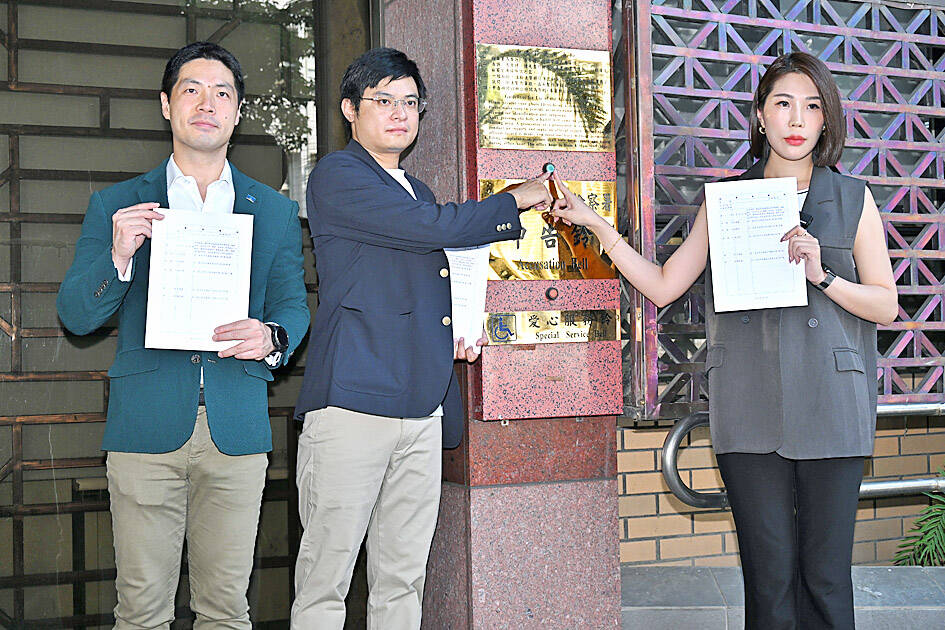Chinese Nationalist Party (KMT) Legislator Wang Hung-wei (王鴻薇) on Monday suspended her office assistant and ordered an administrative probe following accusations of improper influence and demands for payments while representing the lawmaker’s office and a promotions firm.
On Monday, representatives of a youth alliance (青年監督聯盟) told a news conference that they had documents showing that the office assistant, Chang Kai-wei (張凱維), had allegedly contravened the Anti-Corruption Act (貪污治罪條例) by soliciting “business cooperation” and demanding annual payments of NT$2.3 million (US$74,770) from pharmaceutical firm Amgen Taiwan for consultation and promotional work.
Alliance founder Chen Yu-hsin (陳又新) and director Hsu Yu-teng (許譽騰), as well as media personality Wendy Ma (馬郁雯), asked Chang and Wang to explain the business proposal to the public, as well as why cash had been sought from Amgen.

Photo: Tu Chien-jung, Taipei Times
They asked if Chang had acted alone or if Wang had consented to the plan.
In May last year, Chang, representing Taipei-based Air Force Marketing Media Co, had proposed the business plan to Amgen, which has been developing treatments for cancer and had been seeking approval to conduct clinical trials and to put drugs on the market, Chen, Hsu and Ma told the news conference.
“Chang’s plan included short, medium and long-term goals,” Chen said. “Chang’s roadmap outlined how he and the media company would organize media events, meetings with lawmakers, academic conferences and public hearings for Amgen, even promising to have their work presented to legislative committees.”
Chang sought payments for consultation and publicity work, as well as NT$10,000 for each media event or public hearings and NT$200,000 for arranging access to an academic conference involving the medical and pharmaceutical sectors, Ma said.
“Chang introduced himself as an office assistant to Wang, who has the authority to convene public hearings, draft bills and influence public policy,” Chen said.
“The only way the model made sense was if Chang was a legitimate representative of Wang, which is typical in cases of improper influence and corruption,” Chen said, citing Article 4, Item 2 of the act, which stipulates prison terms of 10 years to life, or a fine of up to NT$100 million for those convicted of “acquiring valuables or property through the use of undue influence, blackmail, forced acquisition, forced seizure or forced collection.”
“Chang wore a vest bearing Wang’s name at public events and handed out business cards that said he worked in a legislative office,” Hsu said. “It is not difficult to believe that he had Wang’s consent.”
Separately, Wang said in a statement that she would never demand a bribe or tolerate such behavior among her assistants.
Chang has been suspended from his position with immediate effect while an administrative probe is conducted, she said.
The allegations have no basis in fact, she added.
Chang later told reporters that he would file a lawsuit against Chen, Hsu and Ma, saying that the accusations were false.
He said that he presented a “brief report” to Amgen and was not working for Air Force Marketing Media.
Moreover, Wang’s office has not introduced bills related to the pharmaceutical sector, he added.

The first global hotel Keys Selection by the Michelin Guide includes four hotels in Taiwan, Michelin announced yesterday. All four received the “Michelin One Key,” indicating guests are to experience a “very special stay” at any of the locations as the establishments are “a true gem with personality. Service always goes the extra mile, and the hotel provides much more than others in its price range.” Of the four hotels, three are located in Taipei and one in Taichung. In Taipei, the One Key accolades were awarded to the Capella Taipei, Kimpton Da An Taipei and Mandarin Oriental Taipei. Capella Taipei was described by

The Taichung District Court yesterday confirmed its final ruling that the marriage between teenage heir Lai (賴) and a man surnamed Hsia (夏) was legally invalid, preventing Hsia from inheriting Lai’s NT$500 million (US$16.37 million) estate. The court confirmed that Hsia chose not to appeal the civil judgement after the court handed down its ruling in June, making the decision final. In the June ruling, the court said that Lai, 18, and Hsia, 26, showed “no mutual admiration before the marriage” and that their interactions were “distant and unfamiliar.” The judge concluded that the couple lacked the “true intention of

EVA Airways today confirmed the death of a flight attendant on Saturday upon their return to Taiwan and said an internal investigation has been launched, as criticism mounted over a social media post accusing the airline of failing to offer sufficient employee protections. According to the post, the flight attendant complained of feeling sick on board a flight, but was unable to take sick leave or access medical care. The crew member allegedly did not receive assistance from the chief purser, who failed to heed their requests for medical attention or call an ambulance once the flight landed, the post said. As sick

INDUSTRY: Beijing’s latest export measures go beyond targeting the US and would likely affect any country that uses Chinese rare earths or related tech, an academic said Taiwanese industries could face significant disruption from China’s newly tightened export controls on rare earth elements, as much of Taiwan’s supply indirectly depends on Chinese materials processed in Japan, a local expert said yesterday. Kristy Hsu (徐遵慈), director of the Taiwan ASEAN Studies Center at the Chung-Hua Institution for Economic Research, said that China’s latest export measures go far beyond targeting the US and would likely affect any country that uses Chinese rare earths or related technologies. With Japan and Southeast Asian countries among those expected to be hit, Taiwan could feel the impact through its reliance on Japanese-made semi-finished products and